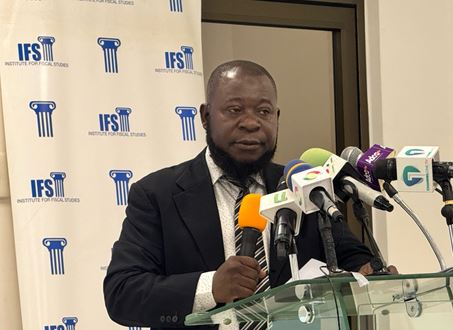By Joshua Worlasi AMLANU
The Institute for Fiscal Studies (IFS) has urged government to prioritise maximising revenue from its natural resources as a key strategy to address the country’s ongoing economic challenges.
This recommendation comes amid concerns over missed revenue targets and economic fragility.
In a recent policy brief, the IFS highlighted the economy’s critical need to derive greater benefits from its natural resource wealth – particularly in the face of persistent revenue mobilisation challenges.
The brief emphasises that despite the country’s rich endowment in resources like gold and oil, it has yet to fully capitalise on these assets for revenue generation.
Dr. Said Boakye, Senior Research Fellow at IFS, stressed the importance of this approach. “Like gold and oil, it is imperative that we enjoy significant benefits from them as others do. This means that maximising revenue generation from natural resources should be central in the country’s quest and strategy to significantly increase government revenue mobilisation,” he stated.
The IFS report comes following the 2024 Mid-Year Fiscal Policy Review presented to parliament by Finance Minister Dr. Amin Adam. The review revealed that total revenue and grants fell below target by GH¢1.4billion, underscoring the urgent need for more effective revenue generation strategies.
Total revenue and grants outturn fell below its target of between GH¢76.1billion and GH¢74.7billion, with domestic revenue and foreign grants underperforming their targets by GH¢221million and GH¢1.2billion respectively.
Dr. Boakye outlined specific recommendations for enhancing revenue from the natural resource sector. “Government should increase its ownership interests in the natural resource sector or adopt superior contractual arrangements like production-sharing agreements,” he advised.
These measures, according to Dr. Boakye, have proven successful in other countries; helping them capture a larger share of earnings from their natural resource sectors.
The policy brief also touched on the broader economic context, noting that the revised 2024 total revenue and grants target of 17.4 percent of GDP appears “out of sync with reality and is thus not achievable”.
This assessment underscores the importance of exploring alternative revenue sources, with natural resources presenting a significant opportunity.
Dr. Boakye emphasised that maximising natural resource revenue is not just about immediate financial gains, but also about long-term economic stability.
“By optimising our approach to natural resource management and revenue collection, we can create a more robust fiscal foundation for Ghana’s future,” he explained.
The IFS recommendations extend beyond natural resources, calling for a comprehensive review of tax exemptions and cautioning against the politicisation of economic policy decisions – especially as the country approaches the 2024 elections. However, the focus on natural resources stands out as a key strategy for boosting Ghana’s fiscal health.
“Government must recognise that our natural resources are a national treasure that, if properly managed, can significantly contribute to our economic recovery and growth,” Dr. Boakye added.
He urged swift action in implementing these recommendations, noting that the temporary nature of recent debt relief measures makes it crucial to establish more sustainable revenue sources.










